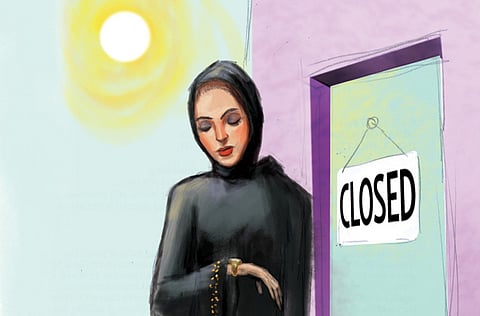When leisure is disguised as faith
Tariq A. Al Maeena writes: Many places in Saudi Arabia close their doors for nearly an hour

While having an early morning breakfast at Fuddruckers recently, my wife asked me what the theme of the week's column was going to be. I told her that I hadn't started on one, and neither had I zeroed in on a topic yet. In the back of my mind I had been mulling over the changing profiles of regional politics and events, and specifically on the induction of Saudi troops into Bahrain, but that needed a bit more time and research to put together. And time was something I didn't have the luxury of. Deadlines are often a writer's greatest dilemma.
"Why not write about the prayer break times?" she volunteered helpfully as she often does when I present her with a blank look.
"Why don't you bring out the issue of the extraordinary number of break times business establishments take in Saudi Arabia, and the unpleasant impact it has on the consumer?"
And as I sat there across her munching away at my Spanish cheese omelette and toast, the seeds of this week's column had begun to form. It is an issue that undeniably affects most of us in the Kingdom, and is disguised in the form of prayer times where shops and establishments have to allow their staff to take prayer breaks.
Visitors from the Gulf Cooperation Council states to Saudi Arabia are often taken aback by this practice of closing everything down way before and way beyond prayer times.
It is as if someone has decreed that there would be no activity during these long minutes. From medical personnel to pharmacies and petrol stations, everybody is off during prayer times.
Apart from the pre-dawn prayers, there are four other periods in the day when most activity ceases under the pretence of being faithful.
As a matter of fact, this custom of mandatory closing of establishments during prayers had been promoted and enforced by the Commission for the Promotion of Good and the Prevention of Vice often at the risk of dragging away the staff at any offending establishment that did not close its doors well before prayer calls. Such attitudes have led to the creation of new Saudi customs, one of simply being a long break for most of the working staff during prayer times.
Prayers do not run over five to ten minutes at the most. But a lot of places close their doors for nearly an hour. What's worse is when one is halfway through their shopping, and is unceremoniously booted out of the store as the staff eagerly prepares to shut down in preparation for the prayers.
And this great hurry does not necessarily manifest itself to heading for prayers. One just has to wander in shopping malls during prayer breaks and notice these sales personnel having a chat or a smoke outside their closed shops while the rest are at prayers to realise that indeed these are disguised break times at the expense of the consumer.
Remarkable
I have prayed at the mosques in Makkah and Madina, and what I found extremely remarkable is that the shops bordering these two great mosques close up barely a minute before prayer times and open up a minute later. None of the stretch of a 5-10 minute prayer break into a one hour rest period.
And understandably, most of the sufferings from such louts of loiter falls upon women. Very few establishments here show any care or concern for the needs of women during prayer times. And as there are very few rest areas for them either, they have to manage and perch themselves on side-railings and sidewalks and wait. It is not very pleasant, and worse so during the hot summer months.
So what should be done? To begin with, employers must limit prayer breaks to realistic and reasonable times. Forty five minutes to an hour is just too long. Employers should note that the times for observing one's faith are being abused by some very unfaithful employees who use these periods as long extended siesta breaks. Essential businesses such as pharmacies and petrol stations should be allowed to remain open while their staff coordinate their prayers through staggering.
And facilities should be set aside to where women and children can pray or rest comfortably while the stores are shut down. It is not enough to simply boot them out of stores and onto hallways of crowded malls and sidewalks where comfortable seating is usually non-existent, or where summer temperatures can be torturous in a fully cloaked black abaya..
Don't get me wrong. This is not an attack on those who close up to practise their faith. For each one of us should be granted those times to say our prayers, and within a reasonable time. But for those who chose instead to use these times as long and happy breaks, to them I say enough is enough!
Tariq A. Al Maeena is a Saudi socio-political commentator. He lives in Jeddah, Saudi Arabia.



